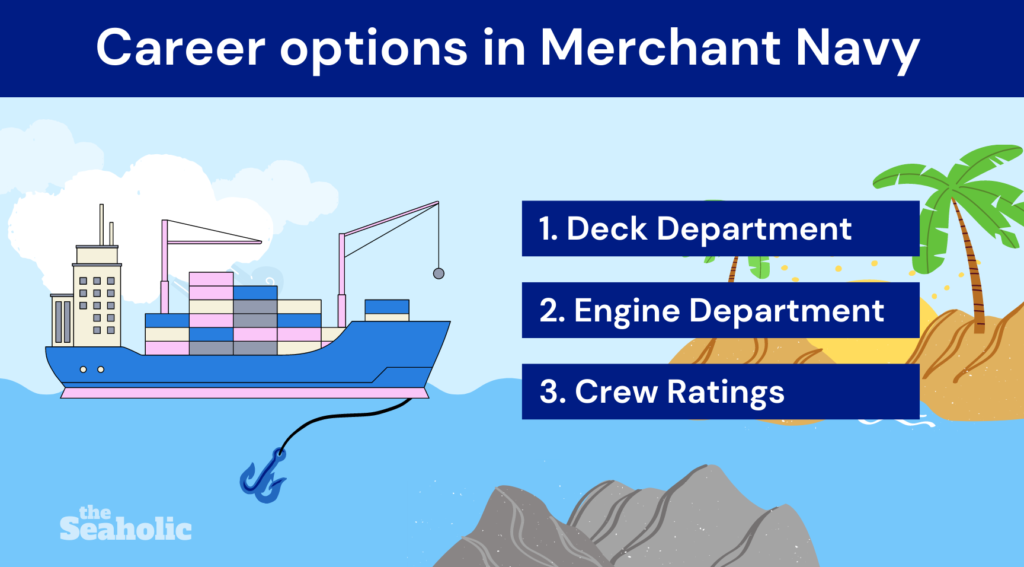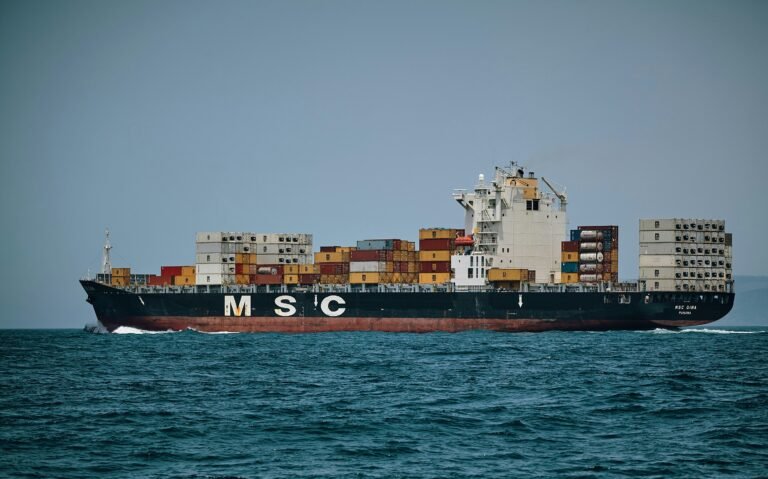How to Join Merchant Navy in India – A Complete Guide
Confused on How to Join Merchant Navy in India? Here’s an complete Guide on 100% Safest & Genuine way of Joining merchant Navy in India.
The merchant navy offers an exciting and rewarding career path for individuals with a passion for the sea and a desire for adventure. If you’re interested in joining the merchant navy in India, this comprehensive guide will provide you with valuable insights and a step-by-step roadmap to kickstart your journey.
From the necessary qualifications to the selection process, we’ll cover all the essential information you need to know to embark on a successful career in the Indian merchant navy.
- What is Merchant Navy?
- What Are Different Careers Options in Merchant Navy?
- How to Join Merchant Navy after Class 12th
- 4 Ways to Join Merchant Navy after 12th as an Officer
- How to Join the Deck Department in Merchant Navy
- How to Join Engine Department in Merchant Navy as an Engineer
- How to Join Merchant Navy after Class 10th or 12th
- Scope of Merchant Navy
If you don’t Know What Merchant Navy actually is? Read How to Make a Career in Merchant Navy?
What is Merchant Navy?
Merchant navy is a specialized industry that is fully engaged in commercial activities involving the transportation of cargo and passengers through sea routes. As the majority of the world’s commercial activities are carried out through the sea routes, the field of merchant navy has far more prominence across the globe.
The term “merchant navy” means a fleet of commercial ships that are not used for military purposes. The ships and the crew of the merchant navy are a part of the country’s commercial shipping.
- The professionals working on these commercial ships are called mariners or sailors or seafarers or seamen.
- Cargo ships are massive in size and are equipped with the latest and highly advanced technology systems.
- Merchant Navy Officers, Crew play a great role in the development and progress of the global economy.
The merchant navy is a global industry with several nationalities working together on different types of vessels. The industry offers excellent career opportunities both at sea and onshore.
Please Note: Merchant Navy Frauds
What Are Different Careers Options in Merchant Navy?
Merchant navy jobs mainly involve working on a variety of ships as Navigating officers, engineers, or ratings. These are the main three departments on almost all types of ships and they work in coordination to ensure a smooth running of the ship and its operations.

You can Join Merchant Navy in one of the 3 Departments onboard Ship:
1. Deck Department
2. Engine Department
3. Crew Ratings and Saloon/Catering Department
A course in any of the above departments will be the “stepping stone” to further higher Ranks.
Deck Officers: Deck officers are responsible for the navigation, safety, and cargo operations of the ship. They hold positions such as Captain, Chief Officer, Second Officer, and Third Officer, overseeing the ship’s overall operations, navigation, and compliance with maritime regulations.
Engineering Officers: Engineering officers are essential for maintaining and operating the ship’s machinery and systems. These officers include Chief Engineer, Second Engineer, and Third Engineer, who ensure the smooth functioning of engines, electrical systems, and equipment.
Ratings: Ratings form the backbone of the Merchant Navy, performing various tasks on board. They include Able Seamen (AB), Ordinary Seamen (OS), Oilers, and Fitters. Ratings assist in cargo handling, deck maintenance, engine room operations, and other duties as assigned.
Electrical Officers: With the increasing complexity of shipboard electrical systems, Electrical Officers play a crucial role in maintaining and repairing electrical equipment, communication systems, and navigational aids.
Catering Staff: Catering staff, including Chief Cooks and Messmen, are responsible for preparing meals and maintaining the galley, ensuring the well-being and satisfaction of the crew.
How to Join Merchant Navy after Class 12th
Keep in mind that to Join as an officer one has to have a background in Science. Therefore, it is required that you clear your class 12th with PCM>60% (Physics, Chemistry, and Math) along with English. Any additional knowledge about marine instruments, technical terminology, ships, etc. to work to the benefit of the candidate.
Commerce and Arts students can still join, but as ratings, not Officers.
Students who want to join the merchant navy after class 12 need to pass the Indian Maritime University Common Entrance Test (IMU CET) and then acquire a good rank.
Along with IMUCET, students also have to clear their sponsorship exams. Sponsorship refers to getting selected by a company to work aboard their ship after the completion of your pre-sea training course. Students need to appear for sponsorship exams specific to the companies and then later clear the interview. It is the best way to join the merchant navy because it will ensure that you’ll get onboard after completing your course.
It is suggested to first clear your sponsorship exam and then appear for IMU-CET and earn a good rank.
4 Ways to Join Merchant Navy after 12th as an Officer
- Diploma In Nautical Science (DNS) Leading to B.Sc – 1 Yr Pre sea + 18 Months at sea
- B.sc Nautical Science (Residential) – 3 Yrs Pre sea + 12 Months at Sea
- Btech Marine Engineering
- GME (Graduate Marine Engineering)
How to Join the Deck Department in Merchant Navy
To join the deck department, you will have to take up a DNS course of 1 yr leading to BSc Degree or BSc. in Nautical science, which is basically a 3/4 years course. A course in nautical science will pave the road for becoming a deck officer on a ship.
On completion of the nautical science course, you will join a ship as a trainee/deck cadet and then move ahead in the ranking system as = third officer/mate -> second officer/mate -> chief officer/mate ->> Captain
1. DNS (Leading to B.Sc)
Diploma in Nautical Science is an undergraduate course of one year. The course consists of two semesters and provides an opportunity for class 12 students to pursue a career as a Deck Officer.
The one-year pre-sea training course is followed by 18 months of sea time training, during which cadets are entitled to a Stipend (which means you will start getting some money) and free boarding and lodging.
Upon completing 18 months of pre-sea (Which is generally completed by Cadets in 2 years, some take 3 years and Personally It took me 4 years to complete it due to family issues), the candidate comes home and clears his University Final Semester exams along with 2nd Mates COC Exams followed by Orals (takes about 1 to 1.5 yrs)
| Course Level | Diploma |
| Duration | 1 year for DNS + 18 Months Sea-time onboard Ship |
| Eligibility | 10+2/equivalent (PCM Average – Minimum 60%) with a minimum of 50% marks in English subjects in the 10th/12th Examination. There will be a 5% relaxation in eligibility marks; however, it will not apply to English Marks. |
| Age Limit | Minimum age: 17years Maximum age: For Male : General -25 years, OBC(NCL)-28 years, SC/ST-30 years For Females: General -27 years, OBC(NCL)-30 years, SC/ST-32 years. The reference date for the calculation of the age will be from the date of commencement of the Academic Session. |
For Detailed Information & FAQs about DNS Course,
- DNS (Diploma in Nautical Science) in Merchant Navy – Eligibility, Admission, Top Colleges, Jobs & Salary
- Top 10 DNS (Diploma in Nautical Science) Colleges of 2022
2. B.sc Nautical Science
B.Sc Nautical Science is an Graduate course of full 3 years. The course consists of 6 semesters and provides an opportunity for class 12 students to pursue a career as a Deck Officer after completing 12 months of sea-time onboard Ships after completing B.Sc Degree of 6 Semesters.
Upon completing 12 months of sea-time (Which is generally completed by Cadets in 1.5 to 2 years, depends on Waiting period), the candidate comes home and sites for 2nd Mates COC Exams followed by Orals (takes about 1/2 to 1 yr)
| Course Level | Graduate |
| Duration | 3 years + 12 months Sea-time onboard Ship |
| Eligibility | 10+2/equivalent (PCM – a minimum of 60% aggregate) & English – a minimum of 50% in 10th/+2. Note: In the case of SC/ST candidates. There will be a 5% relaxation in eligibility marks; however, it will not apply to English Marks. |
| Age Limit | Minimum age: 17years Maximum age: For Male : General -25 years, OBC (NCL)-28 years, SC/ST-30 years For Females: General -27 years, OBC (NCL)-30 years, SC/ST-32 years. The reference date for the calculation of the age will be from the date of commencement of the Academic Session. |
Also read Top 10 Merchant Navy Colleges in India
How to Join Engine Department in Merchant Navy as an Engineer
1. B.Tech Marine Engineering
Btech Marine Engineering is a 4-year degree course in the stream of Engineering which prepares its students for a career in Marine Engineering. A bachelor’s degree in Btech Marine Engineering acts as an entry point for interested students to join merchant navy through the engine side.
The syllabus includes subjects like- Applied Thermodynamics, Ship Structure & Construction, Naval Architecture, Fluids Mechanics, Marine Heat Engine & Air Conditioning, etc. This blog will cover all you need to know about btech marine engineering so keep reading!
For Diploma candidates with lateral entry to 2nd year of B.Tech, need to have scored 65% and above in Diploma followed by the Degree eligibility criteria.
| Course Name | Btech Marine Engineering |
| Course Type | Bachelor’s Degree Course |
| Duration | 4 years |
| Eligibility | Candidates should have scored a minimum aggregate of 60% in PCM, in class 12. [OR] Candidates with a 3-year Diploma in Mechanical Engineering or a related field from a recognized university can take a lateral entry into the 2nd year of Btech Marine Engineering. [AND] Minimum of 50% marks in English subject in 10th [OR] 12th Examination. All candidates should be between the ages of 17-25. SC/ST candidates get a relaxation of up to 5 years. Female Candidates get a relaxation of up to 2 years. |
| Entrance Exams | IMU CET (Indian Maritime University Common Entrance Test). TMISAT ( Tolani Maritime Institute Science Aptitude Test) |
| Gender Restrictions | N/A |
| Medical Requirement | All candidates need to clear a medical examination conducted by a DG Shipping Approved Doctor. |
2. GME
1-year Graduate B.Tech Marine Engineer Course is a pre-sea training course approved by Directorate General of Shipping (DGS). The course consists of an 8 months long classroom (pre-sea) training and a 4 months long onboard training where the cadet is entitled to stipend, free boarding & lodging.
Eligibility is same as B.Tech Marine Engineering
| Course Level | Graduate |
| Duration | 8 months Pre-sea + 4/8 Months onboard Ship |
| Eligibility | Candidates who have completed their 10+2 education in the science stream from a recognized board where they have studied Physics, Chemistry, and Mathematics compulsorily and have secured a minimum overall aggregate of 60% are eligible. [OR] Candidates who have a 3-year diploma with a minimum of 55% are also eligible through a lateral entry scheme or 4 Yrs B.Tech in Mech Engineering |
| Age Limit | Minimum age: 17years Maximum age: For Male : General -25 years, OBC(NCL)-28 years, SC/ST-30 years For Females: General -27 years, OBC(NCL)-30 years, SC/ST-32 years. The reference date for the calculation of the age will be from the date of commencement of the Academic Session. There will be a 5% relaxation in eligibility marks; however, it will not apply to English Marks. |
Also read: GME – B.Tech Marine Engineering
How to Join Merchant Navy after Class 10th or 12th
1. GP Rating Course
Please Note: GP Rating courses are for Ship Crew Jobs and Not Officers
This course is of six months. This is a Pre-Sea Training course – course that we take before sailing on a ship. The GP Rating program prepares cadets for two major positions in the maritime industry:
Deck crew and Engine crew.
GP Rating cadets are Trained for onboard Manual Jobs like Machine Handling, Chipping & Painting, Cleaning Jobs, Ship mechanics, swimming, Fire prevention and other Manual Hardship Jobs regarding Ship Maintenance
This course is conducted twice a year, with classes beginning in January and July of each year.
| Course Level | Certificate |
| Duration | 6 Months |
| Eligibility | A minimum of 40% from a recognized board is required in English, Science, and Mathematics in the 10th or 12th grades. |
| Age Limit | The candidates must be between 17.5 to 25 years of age when the course starts. |
2. Saloon/ Catering Course
These courses focus on developing expertise in culinary techniques, food safety and hygiene, customer service, and the management of onboard dining facilities. By undertaking a saloon/catering course, individuals can enhance their employability and open doors to a range of job opportunities in the maritime industry.
| Course Level | Certificate |
| Duration | 6 Months |
| Eligibility | Passed class 12th from a recognized board |
| Age Limit | The age of candidate should be between 17½ to 25 years of age. |
Skills Acquired in Saloon/Catering Courses
- Culinary Skills: Saloon/catering courses provide comprehensive training in various culinary techniques, including food preparation, cooking methods, menu planning, and presentation. Students learn to prepare a diverse range of dishes, catering to different dietary requirements and cultural preferences.
- Food Safety and Hygiene: Maintaining high standards of food safety and hygiene is paramount in the maritime industry. Saloon/catering courses educate students on proper handling, storage, and preparation of food to prevent foodborne illnesses and ensure compliance with health regulations.
Scope of Merchant Navy
The merchant navy offers a vast scope of opportunities for individuals seeking a dynamic and rewarding career at sea. With its global operations and diverse roles, the maritime industry presents a wide range of prospects for professionals across various domains. In this article, we will delve into the scope of merchant navy and highlight the exciting avenues it encompasses.
Deck Department
The deck department plays a crucial role in the safe navigation and operation of a vessel. Career options within the deck department include:
- Deck Cadet: Deck cadets undergo structured training programs to become officers responsible for navigation, cargo operations, and vessel maintenance.
- Navigating Officer: Navigating officers are responsible for charting courses, supervising the crew during navigation, and ensuring compliance with international maritime regulations.
- Deck Officer: Deck officers hold positions such as Third Officer, Second Officer, and Chief Officer. They are responsible for managing the vessel’s deck operations, cargo handling, and safety procedures.
- Master Mariner: The highest-ranking officer on board, the Master Mariner, or Captain, is responsible for overall vessel management, ensuring safety, and adhering to legal and regulatory requirements.
Engineering Department
The engineering department is responsible for the operation and maintenance of the vessel’s machinery and systems. Career opportunities within the engineering department include:
- Trainee Marine Engineer: Trainee marine engineers undergo comprehensive training to operate and maintain the ship’s propulsion systems, power generation equipment, and auxiliary machinery.
- Marine Engineer Officer: Marine engineer officers hold positions such as Fourth Engineer, Third Engineer, Second Engineer, and Chief Engineer. They are responsible for managing the vessel’s engineering operations, maintenance, and troubleshooting.
- Electro-Technical Officer (ETO): ETOs specialize in electrical and electronic systems, ensuring their efficient functioning and troubleshooting electrical equipment on board.
Saloon/Catering Department
The saloon/catering department is responsible for providing quality food and hospitality services on board ships. Career options within this department include:
- Chief Cook: The chief cook oversees the preparation and service of meals, manages the galley, and ensures food safety and hygiene.
- Steward: Stewards are responsible for housekeeping, maintaining cleanliness in passenger areas, and assisting with meal service.
- Bar Staff: Bar staff manage onboard bars, ensuring efficient service and compliance with safety regulations.
Offshore and Specialized Vessels
Apart from traditional merchant navy roles, the maritime industry offers opportunities in specialized sectors such as offshore support vessels, research vessels, cruise ships, and luxury yachts. These sectors require skilled professionals in various domains, including navigation, engineering, hospitality, and technical operations.
Shore-based Opportunities
The scope of the merchant navy is not limited to seafaring roles alone. Shore-based opportunities within the maritime industry include:
- Maritime Administration: Working with maritime regulatory bodies, port authorities, and classification societies to ensure compliance and safety standards.
- Marine Surveying: Conducting surveys and inspections of vessels, cargoes, and marine facilities to ensure compliance with industry regulations.
- Maritime Education and Training: Becoming an instructor or faculty member in maritime training institutes, shaping the next generation of seafarers.
- Maritime Consulting: Providing consultancy services in areas such as ship management, logistics, and maritime law.
Joining the merchant navy in India offers a promising career path filled with adventure, international exposure, and personal growth. By following the steps outlined in this guide, you can navigate the selection process, acquire the necessary qualifications, and embark on a successful journey in the maritime industry.
Remember, a career in the merchant navy requires dedication, a strong work ethic, and a passion for the sea.
Good luck on your exciting voyage!
You may also like,
- How to Avoid Frauds in Merchant Navy?
- Merchant Navy Frauds
- DNS (Diploma in Nautical Science) in Merchant Navy – Eligibility, Admission, Top Colleges, Jobs & Salary
- Top 10 DNS (Diploma in Nautical Science) Colleges of 2022

